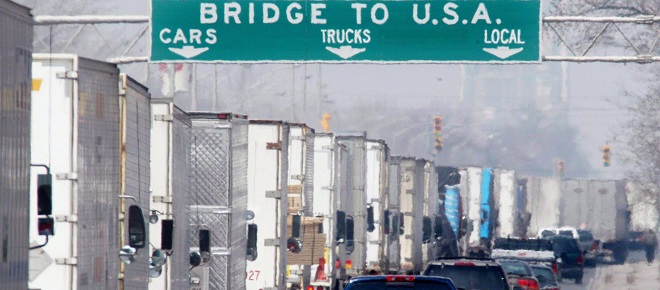Canada can’t escape American insecurity
Tease the day: Canada’s caught up in American woes on budgets, foreign enemies and energy
Three-hour delays snarl truck traffic along Huron Church Road in Windsor, Ont., Wednesday, April 2, 2003. at the Canada-U.S. border. Long flight delays. A loss of lucrative American business contracts. The much-heralded Beyond the Border initiatives put on the back burner indefinitely. Canada will feel the sting if U.S. Congress fails this week to avert what’s known as sequestration, an array of massive, mandated spending cuts to a host of federal departments and agencies aimed at reducing the gargantuan American national debt. THE CANADIAN PRESS/Jason Kryk
Share

When you live next door to the United States, you can’t escape that country’s fiscal and national insecurity. Americans are grappling with a couple of threats to their collective way of life: tight budgets at home and unpredictable enemies abroad. For better or worse, Canadians could get pulled into both whirlpools of insecurity.
The U.S. Department of Homeland Security’s draft budget for 2014 includes the implementation of a border-crossing fee. First, the department want to study the issue. Not surprisingly, Canadian officials are universally opposed to the idea, calling it a step backwards after years of work to streamline the border.
Yesterday, Public Safety Minister Vic Toews didn’t rule out Canadian participation in a renewed continental missile shield, a partnership resoundingly rejected by former prime minister Paul Martin in 2005. “I think we need to have a broader discussion about that and I’m not prepared to venture an opinion at this time,” he told CTV’s Question Period.
There’s a third American insecurity, of course: energy. On that front, The Globe and Mail‘s John Ibbitson reports that U.S. President Barack Obama’s approval of the Keystone XL pipeline is all but assured, in the wake of opinion polling that suggests three-quarters of the American public support the pipeline.
On budgets, foreign enemies, and energy, today’s newspapers demonstrate once again that Canada can’t escape the reach of its insecure neighbour to the south.
What’s above the fold this morning?
The Globe and Mail leads with the probable approval of the Keystone XL pipeline in the United States. The National Post fronts the severe condition in which suspected Boston bomber Dzhokhar Tsarnaev finds himself. The Toronto Star goes above the fold with $500,000 is unused, and now expired, hand sanitizer. The Ottawa Citizen leads with Tsarnaev’s severe injuries. iPolitics fronts a provincial private member’s bill in Ontario that would allow greater custody rights for grandparents. CBC.ca leads with an apparent weapons stockpile formerly in the possession of the suspected Boston bombers. National Newswatch showcases John Ivison’s column in the National Post about what a ruling this week by Speaker Andrew Scheer on Conservative MP Mark Warawa’s point of privilege could mean for the functioning of the House of Commons.
Stories that will be (mostly) missed
| 1. Line 9. Enbridge has donated thousands of dollars to community initiatives along the route of one of its pipelines The company is applying to reverse the flow of Line 9 in Ontario and Quebec. | 2. Sex assault. A former medical technician in the Canadian Forces who was convicted of sexual assault in 2011 now faces 31 new charges, including a dozen counts of sexual assault. |
| 3. “Austerians”. Finance Minister Jim Flaherty is among a shrinking group of austerity-prone representatives to G20 finance talks that are increasingly focused on short-term growth. | 4. Post-secondary funding. Calgary’s Mount Royal University is cutting several programs in the face of budget cuts, a possible harbinger of things to come for schools across Canada. |